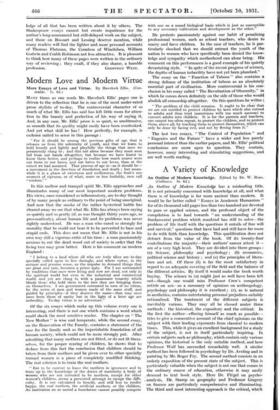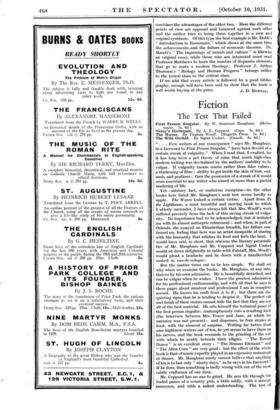A Variety of Knowledge
An Outline of Modern Knowledge. Edited by Dr. W. Rose. (Gollancz. 8s. 6d.) An Outline of Modern Knowledge has a misleading title. It is not primarily concerned with knowledge at all, and what there is of knowledge is far more ancient than modern. It would be far better called Essays in Academic Humanism " for of its thousand odd pages less than two hundred are devoted to pure or applied science, and the professed object of the compilation is to lead towards " an understanding of the fundamental problem which mankind has still to solvethe problem of life itself with the questions it entails of free will and survival," questions that have had and still have far more to do with faith than knowledge. This qualification does not detract from the value of the book. Of its twenty-four contributions the majority—their authors' names attest it- are of a very high level. They are divided into three groups : (a) Science, philosophy and psychology ; (b) economics, political science and histmy ; and (c) the principles of litera- ture and art. Of these (b) is far the most satisfactory in regard to an adequate covering of the field and the balance of the different articles. By itself it would make the book worth buying. The science in (a) might just as well have been left out—though one would miss Professor Crew's competent article on sex--as a summary of opinions on anthropology, psychology and philosophy it is excellent ; (c), as is natural in aesthetics, contains entertaining personal prejudices suitably rationalised. The treatment of the different subjects is inevitably various. They may all be classed under three methods : the historical, the expository and the critical.- In the first the author—effacing himself as much as possible— tries to give a consecutive account of the chief opinions on the subject with their leading exponents from classical to modern times. This, while it gives an excellent background for a study of the subject, is not in itself particularly inspiring. In certain subjects such as which contain only various opinions, the historical is the only suitable method, and here Professor Wolf has succeeded remarkably well. A sirnilar method has been followed in psychology by Dr. Aveling and in painting by Mr. Roger Fry. The second method consists in an orderly exposition of the present state of the subject. This is particularly valuable when the subject is not one that comes in -the ordinary course of education, otherwise it may easily descend to text book_ style. Here Dr. Fliigel on psycho-' analysis, Dr. Stamp on geography and Professor. Gregory on finance are particularly comprehensive and illuminating. The third and most interesting approach is the critical, which combines-the advantages of the other .two. - Here the-different points of view are opposed and balanced against each other and the author tries to bring them together in a new and original synthesis. Of this type the best example is Mr. Dobb's " Introduction-to Economics," which shows at the same time the achievements and the failure of economic theories. Dr. Marett's " The beginnings of morals and culture " is likewise an original essay, while those who are interested must read Professor Matthews to learn the number of disparate elements that go to make a modern theology. Professor J. Arthur Thomson's " Biology and Human Progress " belongs rather to the lyrical than to the critical class.
If we add that every article is followed by a good biblio- graphy, enough will have been said to show that the book is



















































 Previous page
Previous page